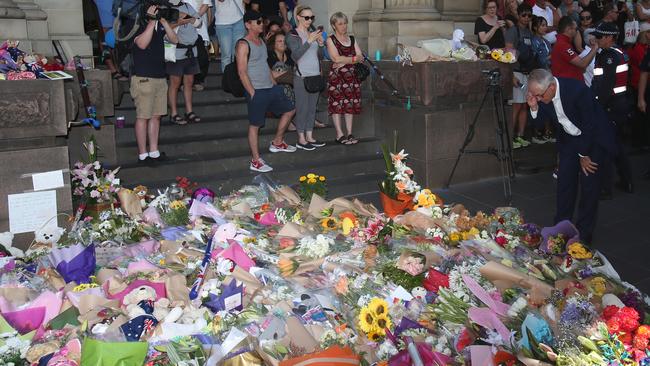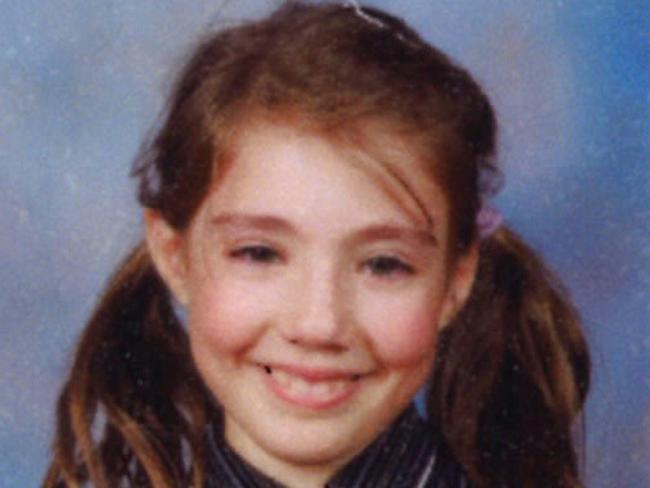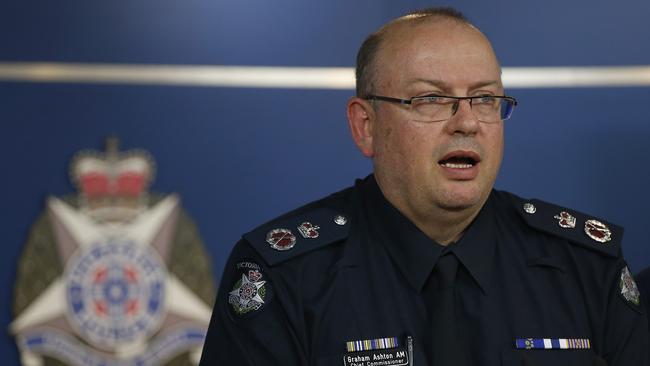They should be alive
THE heartbreaking tragedy of Friday’s atrocity is turning now to tough questions. Tears are turning to anger.

Opinion
Don't miss out on the headlines from Opinion. Followed categories will be added to My News.
THE heartbreaking tragedy of Friday’s atrocity is turning now to tough questions. Tears are turning to anger.
Once again, Victorians have been left with a sense of outrage in the wake of innocent lives taken and families left in ruin courtesy of a heinous act by an accused man who should not have been free in the community.
Victoria’s justice system is broken.
It is broken on a range of levels and people have had enough.
From the parole fiasco of recent years and routine occasions where sentences fail to have any resemblance to the gravity of crimes, to the youth justice farce, Victorians are demanding real and urgent change.
Many of the questions being asked by Victorians after the Bourke St massacre cannot yet be fully discussed or answered due to publication restrictions to ensure a fair trial for accused multiple-killer Dimitrious Gargasoulas.
But legitimate and necessary questions must be asked about how Gargasoulas was allowed to be freed on bail pending a charge laid a week before Friday’s alleged maniacal rampage.
What is on the public record is Victoria Police Chief Commissioner Graham Ashton stating that Gargasoulas, 26, had been given bail by a bail justice for an alleged assault matter despite police objections.


Over the last five years, Victorians have been fatally let down by the justice system — think of the horrific murders of Jill Meagher, 29, Luke Batty, 11, and Masa Vukotic, 17, among others.
In sentencing Sean Christian Price to life with a minimum 38 years for the stabbing murder of Masa, Supreme Court Justice Lex Lasry lamented the “catastrophic example of mismanagement” that allowed the convicted rapist to be living in the community, including the fact Price told his corrections case worker he was harbouring violent urges.
Victorian Coroner Ian Gray last year found the murder of Jill Meagher was “preventable” because her rapist and killer, Adrian Ernest Bayley, with his extensive and violent criminal history, should never have been walking the streets on parole while facing further charges.
Bureaucratic and human failings, a live arrest warrant unexecuted, ineffective intervention orders and a prematurely closed child protection file were also a factors when Luke Batty’s father, Greg Anderson, battered the young boy to death and sickened a nation.
On each occasion authorities said “enough is enough” and vowed to fix cavernous flaws in the system.
Yet here we are again, families of innocent victims and the community left to mourn after another bungle appears to have given Gargasoulas liberty when he should have been locked up.
Mr Ashton has aired his frustrations at bail being granted on occasions where his officers have objected to an alleged offender being released.
Gargasoulas was described by Mr Ashton as someone well known to police, with a history of drug taking and mental health problems. How could a bail justice, effectively a lay volunteer who adjudicates on remand or bail options after hours, not heed police concerns?
This apparently horrendous mistake is emblematic of the broader and enduring problems within our court system where magistrates and County Court and Supreme Court judges are regularly showing themselves to be grossly out of step with community expectations.
It is an indictment on a system that is supposed to serve a community but routinely fails to protect it.
For decades, the scales of justice have been far too heavily weighted in favour of potential or hoped-for rehabilitation instead of the rights of victims, victims’ families and potential or likely future victims.
Thousands of Victorians marched in tribute and solidarity after the horrendous murder of Jill Meagher.
The outcry surrounding Bayley’s parole and failure of the Adult Parole Board to have him re-incarcerated immediately following an assault charge led to a major review of parole laws. But it was far from the first occasion in which a faltering justice system was left with blood on its hands.
At least eight other murders had been committed by Victorian parolees in the years shortly before when case workers failed to notify the Adult Parole Board of fresh charges, parole violators had incorrectly retained their liberty or a delayed upgrade left the police LEAP database blind to the parole status of some offenders.
While the parole controversies related to the end of the minimum sentence phase in the justice system, we are faced with the realisation that the start of the process — where bail can be sought or applied, is also beset with potentially lethal flaws.
Major changes to bail laws must be made to ensure the risk to the community and police objections to release an accused person are given primacy in any decision to grant bail to someone facing violence-related charges.
The judicial system is a human system, set within a legislative framework and individual cases have as many variables as can be imagined.
In other words, the system is not perfect and perhaps never can guarantee that an alleged offender who is granted bail will not reoffend.
But the justice system must adopt greater safeguards to prevent high-risk individuals being freed back into the community.
The carnage and mayhem in Bourke St on Friday sent a shock through the state and the nation.
The scale of devastation — five dead, including two children, 10-year-old Thalia Hakin and a three-month-old boy, as well as another 14 hospitalised — is still being digested.
Thalia’s sister Maggie, 9, and her mother Nathalie, remain in hospital.
Matthew Si, 33, was killed shortly after he finished lunch with wife, Melinda and Jess Mudie, 22, a “bright bubble of joy”, also died.
These are the human faces of the tragedy.
And the lives of several others critically injured remain hanging in the balance.

Mr Ashton, together with Premier Daniel Andrews, State Coroner Sara Hinchey, the state Opposition and the Police Association have united in their vow to fully review the bail system and tighten laws and processes where required.
The first step, as Police Association secretary Bruce McKenzie points out, should be replacing bail justices with on-call magistrates who are better equipped to deal with the complex balance of public risk versus the rights of an accused person.
The current system, as has been shown too many times, has got that crucial balance tragically wrong and tragically often.
The first hurdle in any process in contemplating whether an accused person is granted bail must always be the risk he or she poses to victims and the wider public.
Risk of reoffending is always cited in bail applications but its place as the most important consideration is often lost as arguments and promises are made about issues such as attending drug rehabilitation, abiding by curfews, not contacting or interfering with witnesses or reporting to police.
Violence, evidence of drugs or alcohol abuse, seriousness of offence, prior history of offending and mental health are all primary factors that are supposed to underpin judgments rejecting bail in violent cases.
Too often they are swept to the side in some vain attempt to encourage lawful behaviour through freedom — grant bail and hope an accused person doesn’t reoffend.
The full circumstances put before the bail justice in the Gargasoulas case are as yet unclear.
But where police do oppose bail, as they did with Gargasoulas, it is ludicrous that officers who know the case and the alleged offender best are ignored by a bail justice.
Of course, it cannot be the case that police always dictate the outcome of bail applications — that would usurp the jurisdiction and independence of the court system.
But where bail justices are involved, police requests to reject bail should always be strictly adhered to.
If, subsequently, a more comprehensive bail application is put formally before a magistrate or judge, then the outcome may differ.
But the bar, even before magistrates and judges, is currently set too low. Alleged offenders are often being given second, third or more chances.

Greater focus must also be given to Victoria’s Crisis Assessment and Treatment Team resources to ensure people with mental health and violence risks are more closely monitored or subjected to involuntary admissions to hospitals and secure institutions where required.
While the Herald Sun is restricted from publishing certain details about the current case to protect the judicial process, the bail questions and debate it raises must be tackled and resolved.
Not since the Bayley, Price and Anderson cases has there been so much community anger about a justice system which has again failed the state. This time, the price in lives is exponentially higher.
In the 2013 review of the state’s beleaguered parole system, retired High Court judge Ian Callinan noted: “In practice, the paramountcy of the safety of the public has not been given the prominence that it should have.”
The central theme in the parole crisis was that too much emphasis was placed on rehabilitation of offenders and not enough on the possibility of them reoffending.
When it comes to violent offenders, either seeking bail at the start of the judicial process or seeking parole towards the end of the custodial process — public safety and the risk of reoffending must be the defining focus of decisions by authorities.
Authorities may also look at street security as part of wide-ranging reviews, including by the State Coroner.
While police have stated Friday’s horror had nothing to do with terrorism, the visions of horrendous truck attacks in Nice and Berlin were quickly to mind as the Bourke St drama unfolded.
Bollards may now be a sad necessity for Bourke St and more public spaces as authorities continue to look for better protections in this modern, violent paradigm.
The horrific scenes of Friday unfolded in the heart of Melbourne and city workers and visitors will be returning for the first time today with those awful visions of trauma deeply etched on their minds.
The selfless and brave way in which everyday Melburnians, police, ambulance and fire crews assisted the injured and dying was testament to what is great about the Victorian community and will mark our ability to find a way forward.
But the scars on Melbourne, and more particularly, the personal tragedies suffered by those who lost loved ones and who were injured, are indelible.
Floral tributes and cards and a memorial outside the GPO on the corner of Elizabeth and Bourke have replaced the remnants of street triage and the frantic work by ambulance and other emergency workers confronted with scenes normally only witnessed in a war zone.
A vigil at Federation Square from 5.30pm today will also give Victorians a chance to mourn and to reflect on this unspeakable tragedy.
A Bourke Street Fund to raise money for victims and their families, kicked off by $100,000 from the state government, is another step in a positive direction.
But if a society can be judged by the way it reacts to tragedy and challenge, we must find a way to correct the judicial imbalance and place the lives of ordinary people beyond the considerations given to those accused of violence.
We owe that, at the very least, to the Bourke St victims.


